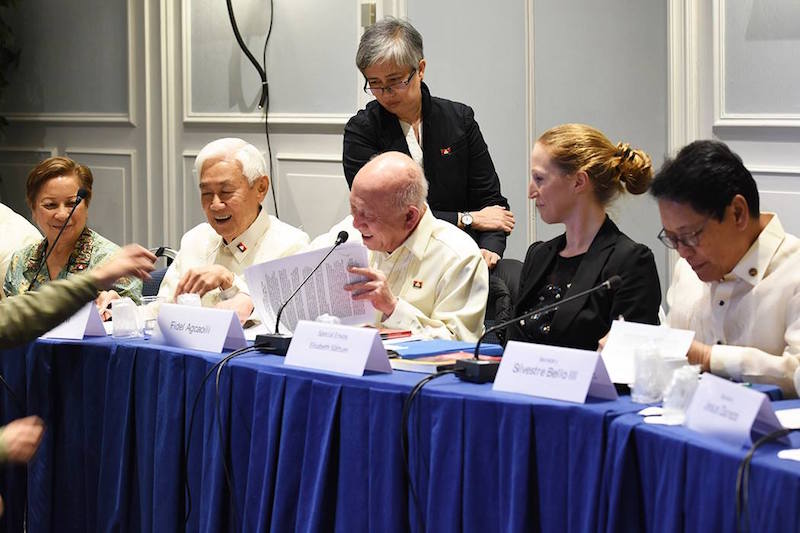LOS ANGELES, California (MindaNews/05 Feb) — Efforts to have the Communist Party of the Philippines-New People’s Army (CPP-NPA) delisted as a foreign terrorist organization (FTO) and to have Prof. Jose Ma. Sison’s name stricken out from the terrorist watch list, are expected to suffer a setback with President Rodrigo Duterte’s announcement in Cagayan de Oro Sunday night that he was classifying them as a “terrorist group.”
Last week, US State Department acting spokesperson Mark Toner said the CPP-NPA still remains on the list of FTOs. The CPP-NPA was designated an FTO on August 9, 2002.
Toner issued the statement via e-mail on February 2 to Filipino journalists participating in the US-Philippines Foreign Press Reporting Tour, a day after NPA spokesperson Jorge Madlos announced they were terminating their unilateral ceasefire effective 11:59 p.m. on February 10 and a day before President Rodrigo Duterte’s announcement lifting the unilateral ceasefire effective evening of February 3.
“The CPP/NPA is a designated FTO and it continues to meet the criteria for such a designation,” Toner said.
 Government peace panel chair SIlvestre Bello III (extreme right) and National Democratic Front peace panel chair Fidel Agcaoili (2nd from left) sign the Joint Statement at the end of the third round of formal peace negoitations in Rome on January 25, 2017. Photo courtesy of OPAPP
Government peace panel chair SIlvestre Bello III (extreme right) and National Democratic Front peace panel chair Fidel Agcaoili (2nd from left) sign the Joint Statement at the end of the third round of formal peace negoitations in Rome on January 25, 2017. Photo courtesy of OPAPP
The CPP-NPA is among 61 groups designated by the US Secretary of State as FTO from 1997 to 2016. Getting delisted is a process and from 1999 to 2015, only 12 groups have been delisted.
On January 25, the Office of the Presidential Adviser on the Peace Process (OPAPP) in a press release from Rome where the third round of formal peace talks between the GRP and NDF was held, said the two panels had recommended that efforts be done by the Philippine government to have NDF chief political consultant Jose Maria Sison stricken out from list of international terrorists to pave the way for his Philippine homecoming without being arrested.
GRP chief negotiator Silvestre Bello III said there is basis for the US to remove the CPP-NPA from the list since its political umbrella, the NDF, is now involved in peace negotiations with the Philippine government.
If the delisting happens, Bello said Sison can join the panels in succeeding talks anywhere outside Europe.
The OPAPP press release said the inclusion of the CPP-NPA in the US terrorist list has become a stumbling block for the return of Sison to the Philippines since the US, through its control of the International Police (Interpol), “can always effect the arrest of Sison outside of EU which is protective of the rights of people seeking political asylum in its member countries.”
“Bello said with a new US president in Donald Trump, it is possible Sison could be stricken from the list of personalities considered by the American government as terrorists,” the OPAPP press release said.
On Sunday night, Duterte told reporters in Cagayan de Oro City that he now considers Sison, his professor in Political Thought in college, to consider “a terrorist.”
“Therefore, to me, the organization that he heads and controls is also a terrorist group,” Duterte said.
“Very ticklisht issue”
During the forum, “When Blue Meets Red: A Conversation on GPH-NDFP Peace Process” at the at the Ateneo de Davao University on June 8, 2016, then NDF spokesperson (now peace panel chair) Fidel Agcaoili said Sison’s return to the country remains “a very ticklish issue” and needs an assurance from the Dutch, Norwegian, and even US government they will not interfere in a way that will result to the derailment of the peace negotiations.
“There should be a guarantee from the Dutch government, Norwegian government, and the US government to respect the sovereignty of the Filipino people in their desire to pursue a just and lasting peace by allowing Sison to come home without interference,” he said.
Agcaoili said that including the CPP-NPA in the terrorist watch list of the US government poses a “real problem” because Sison could be arrested at a foreign airport where he would take the flight to the Philippines, which might “adversely affect the peace negotiations” between the two parties.
Delisting
According to the US Department of State’s website, the Bureau of Counterterrorism “continually monitors the activities of terrorist groups active around the world to identify potential targets for designation.”
The FTO list is renewed every two years or it will cease to be effective, according to a press statement from US State Department on August 9, 2004.
“By law, this redesignation makes it illegal for persons in the United States or subject to U.S. jurisdiction knowingly to provide material support to the Communist Party of the Philippines/New People’s Army; it requires U.S. financial institutions to block assets of this organization; and it provides a basis for the United States to deny visas to representatives and members of the group,” it said.
The designation was done by the Secretary of State in consultation with the Attorney General and the Secretary of the Treasury, it said, adding it was based on the rebel group’s threat of “overthrowing the government of the Philippines.”
According to the State Department’s website, the Immigration and Nationality Act sets out three possible basis for revoking an FTO designation. The Secretary of State “must revoke a designation” if the Secretary finds that “the circumstances that were the basis of the designation have changed in such a manner as to warrant a revocation;” if the Secretary finds that “the national security of the United States warrants a revocation;” and the Secretary of State “may revoke a designation at any time.” (Antonio L. Colina IV / MindaNews)
